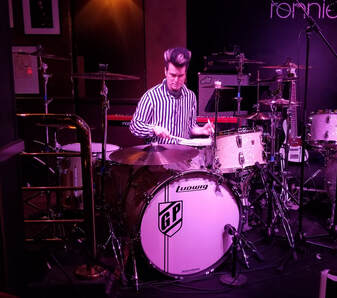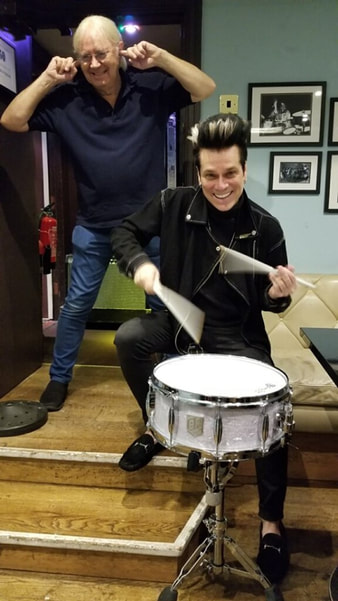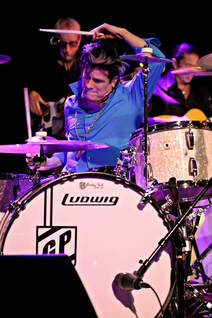Cris: You could argue that, as a drummer, you have the most demanding shoes to fill of anyone. How do you deal with that pressure and those expectations? Gregg: This was never approached in a way that “you're replacing Buddy Rich, you're the next Buddy Rich.” I never came into this with an inkling of, “I'm going to fill up what's missing here.” Buddy had asked Cathy, “(After I am gone) would you please keep the band out, keep the band working? Keep my music alive. Keep playing for young people.” In the beginning Cathy started doing the Buddy Rich memorial concerts. Basically it was one concert and you got maybe seven or eight of the best drummers in the world. I've got one of the posters here in the office from the Buddy Richard Memorial Concert at the Wiltern Theater in Los Angeles. (It featured) Louie Bellson, Gregg Bissonette, Dennis Chambers, Vinnie Colliauta, Steve Gadd, and Dave Weckl. So that's what she originally did. She'd have this one show maybe once every two or three years and you got the best drummers in the world to sit in with the Buddy Rich Band and play through Buddy's charts. That was cool. That was great. She basically single-handedly invented the drum festival. She did many of those over the years, but that really wasn't putting the band out on the road, you know what I mean? My first time playing with the Buddy Rich big band was the 25th anniversary memorial concert in London at the Palladium. You want to talk about a daunting task? Let me read you the line up. Dave Weckl, Ian Pace, Ginger Baker, John Blackwell from Prince's band, Elliot Henshaw, and then Potter. I played the show in 2012 and basically from there we took it (on the road). We play with an alumni band and you get Cathy upfront, because Cathy toured with her father since she was 10 years old. She toured with him and sang on a couple of his records. And so I'm saying you get everything but Buddy. We play his charts. We play it in his style, This isn't a Buddy Rich tribute. It's Cathy's dad's band. Cris: What elements are you when it comes to playing this music? Gregg: I would have to say I'm trying to be as authentic as I can with Buddy's playing, but in no way imitating or duplicating. Cris: Everyone always focuses on things like the solos. But you said in an interview that you have to remember that you are keeping time for 16 guys. Admittedly I never really thought of the number of musicians factoring in. Are you really keeping each guy in mind as you're playing? Gregg: I could be in a rock group with four guys that is basically a bass player, a guitar player and a lead singer. And that's it. When you're playing in a big band, that's a five piece sax section, three guys in the bone section, four trumpet players, and a rhythm section. The rhythm section being a bass player, piano, a guitar player. So really, there are four separate bands up there. It is like those guys that used to drive stage coaches being pulled by eight horses.  You're keeping time for four different groups or sixteen people. You really have to multitask. Cris: Like you're holding multiple perspectives in your head at the same time. Gregg: Yes, exactly. Cris: You also teach master classes. What do you find most students that attend these need to work on? Gregg: What I see with just players all around, when they come to take a masterclass from say a guy like me, it's kind of like shopping for a Ferrari. When you go into that dealer you're not going, "I need something for everyday (driving)." Usually when they come to me, we're talking about technique. When you see something fast and it sounds like there's a lot of things going on there, usually people want that. Like the magic trick explained. But the most important thing for any drummers, anywhere, anytime, is just that you really do need to be a timekeeper. When you listen to Buddy play, when you take the drumming pyrotechnics away from that man, his concept of time, he was able to lay that foundation for people to play over. Keeping time, being solid, is the backbone for any group, whether it's a jazz group, a rock group, a funk band, a country band. With every great Beatles song, at some point you go, "That Ringo guy really just made it move." That's kind of my masterclass format: technique and keeping time are pretty much my focus. Cris: And then, on the flip side, what do you gain from teaching these classes? Gregg: I'm not saying I'm a great teacher, but I'm saying I do like communicating, just like answering these questions that you're asking here. I do like passing along the information.  Gregg with Ian Pace of Deep Purple Gregg with Ian Pace of Deep Purple Cris: You've described yourself as having a showy personality but also an attention to detail. I found that kind of fascinating because they seem like two opposite ends of the spectrum. I mean, normally you don't find those qualities in the same person. How do you balance those within yourself? Gregg: I believe that's called schizophrenia. Well, no, realistically, I have a showy personality in that I'll basically talk to a statue as long as it stands there. But I have an attention to detail with the band. For instance the stage is basically a replica of what Buddy's stage set up was in 1980 with the white music stands, the "BR" on the shield, the band dressed in black. To me that kind of detail in that kind of playing or in that kind of planning... yeah, maybe you wouldn't think that. "Oh yeah. Gregg not only learned all 14 songs, but he's also responsible for the logo printing on the t-shirts"... along with Cathy. I'm very detailed and I'm anxious, which are all things that people that are perfectionists have in them. Cris: You did do a lot of acting work at one point, specifically in movies. And there was a point where you had to decide between that and drumming. What would you advise others who face a similar fork in the road? Gregg: I had a major label record deal on Mercury / Polygram Records with a group called Siren. The album's coming out in February of '89 and we're shooting the video in January of '89. At that point I'm also in "Uncle Buck" which John Hughes was filming here in Chicago. (There were conflicts.) So I had to make the ultimatum choice. Nowadays it is a bit different. It seems that you could be an actor, a musician, a political activist, and a diet guru and all those careers work together. For some reason, back in the day you had to make choices. "Uncle Buck" went on to become the highest grossing comedy of 1989. My album stalled at about number 30 on the charts. But I really was a drummer. And fast forward thirty years and my first gig with the Buddy Rich Band was at the London Palladium. That's pretty heavy. I remember doing my sound check and Ian Pace (Deep Purple) walked in and goes, "Who's this guy?" I had the "Machine Head" album. I listened to the snare drum roll at the end of "Space Trucking." Now, he lets me sit on stage with him when he plays. If we go to one of his shows, he lets me sit on a drum throne right behind the bass player's amps and I get to sit and watch him play. Did I ever think (that would happen) when I was fifteen years old listening to the "Made In Japan" album? It's a dream come true. Comments are closed.
|
Never miss an interview or eBook release
See the full list of Bands To Fans interviews
Learn how we can develop custom content for your band or business
|

 RSS Feed
RSS Feed